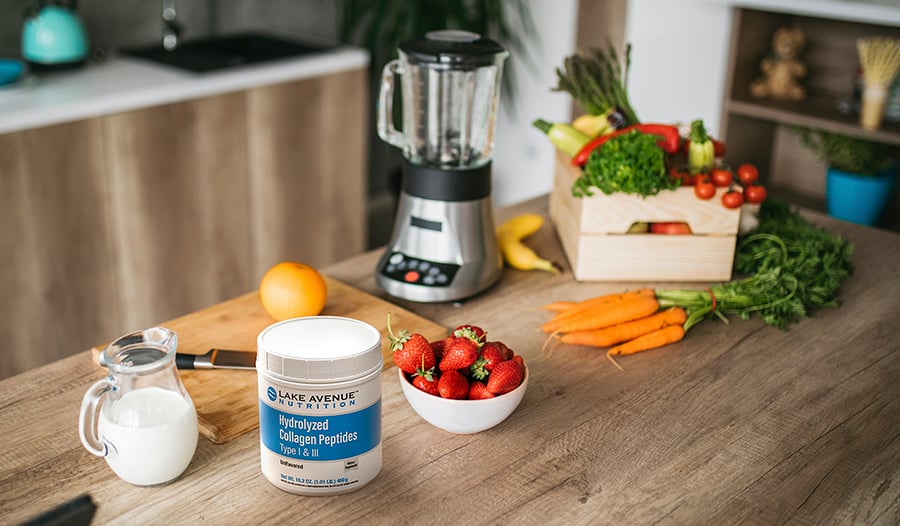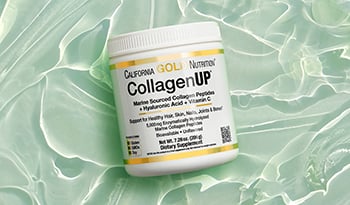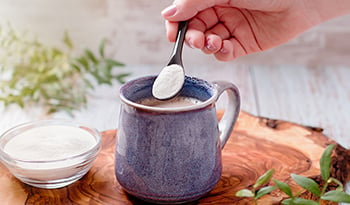Top Tips to Getting the Most From Your Collagen Supplement
DISCLAIMER:This blog does not intend to provide diagnosis...
- In this article:
- How are Collagen Supplements Made?
- What are the Benefits of Collagen Supplements?
- How Can I Make Collagen Supplements More Effective?
- An Important Consideration: What is a Fibroblast?
- Alternatives to Collagen Supplements for Joint Health

Collagen is an abundant protein in the body that makes up the connective tissue found in skin, joints, bone, and blood vessels.
The word collagen comes from the Greek word for glue. It is an appropriate root as collagen along with elastin and hyaluronic acid form the ground substance or “intracellular cement” that literally holds us together.
How are Collagen Supplements Made?
Collagen supplements are derived from a variety of sources, including the skin, bones, and connective tissues of cows, chickens, pigs, and fish. When denatured by heat, collagen forms gelatin, which has been used for centuries as a food source and traditional medicine. So, in other words, gelatin is a source of collagen peptides. In fact, there is evidence that gelatin provides similar benefits to collagen peptides.
Collagen sources are broken down a little more than gelatin to manufacture hydrolyzed collagen or collagen peptides. The benefit is that collagen peptides have a higher water-solubility and no gelation properties, allowing them to be conveniently formulated into not only powdered mixes but also hot and cold liquid drinks.
What are the Benefits of Collagen Supplements?
Skin, Hair, and Nails
As we grow older, natural collagen production also slows throughout the body. Since the dry weight of the skin is composed of 70% collagen and related structures that hold water into place the skin becomes thinner dermis and, with the loss of structure, looks old, weathered, and wrinkled.
Collagen peptides provide valuable amino acids for the health of our skin, hair, joints, and connective tissue. They have been shown to help maintain skin elasticity and hydration, which may help minimize the appearance of skin aging, especially if taken over a six-month period.1,2
Supplementing with collagen may also boost nail growth. One 24-week double-blind study showed collagen peptides (2.5 g per day) increased nail growth 12% and decreased the frequency of broken nails by 42%.3
Joint Health
In the joints, the loss of collagen due to aging may lead to osteoarthritis, and the ligaments and tendons may also weaken. Bone is also rich in collagen. In fact, about 30 to 40% of bone is composed of collagen where it provides the structural matrix upon which mineralization of bone occurs.
In other words, collagen is structurally critical for our bones. Decreased collagen content of the bone is a key underlying factor in low bone density since the amount of collagen determines the number of “bone mineral binding sites.” If the collagen content is low, the bone becomes more brittle, and fracture risk increases dramatically.
4 Ways That Collagen Peptides Benefit Your Body: Read more.
How Can I Make Collagen Supplements More Effective?
Take a Multiple Vitamin and Mineral Formula
To feed the collagen-producing cells throughout the body it is important to provide all the essential nutrients. At least sixteen critical vitamins and minerals are required in the manufacture of collagen and other connective tissue components. What this means is that if there is an insufficiency in one of the nutrients, it literally halts the utilization of collagen supplements as well as the assembly of collagen within the body.
To ensure sufficient intake of these nutrients, take a high-potency multiple vitamin and mineral formula. This recommendation is especially important to skin health.
Every day you shed millions of skin cells and as you slough them off, new cells rise to take their place. You need all of your essential nutrients for skin cells to form properly. In particular, zinc is extremely important in skin cell manufacture and wound healing. A key sign of low zinc is the presence of white lines on the fingernails, indicating poor wound healing of the nail bed even after the least trauma.
Take MSM to Boost Sulfur Levels
Sulfur is also a very important nutrient for the skin, hair, and nails because it acts to stabilize the support structures of these tissues like collagen and other components of the connective tissue matrix.
MSM (methyl-sulfonyl-methane) is a major form of sulfur in the human body. Collagen utilizes sulfur to form sticky bonds with other neighboring proteins. MSM may also be important in preventing brittle or weak nails. To ensure optimal sulfur levels, take at least 1,000 mg of MSM daily.
Take Silica to Stimulate Collagen Synthesis
A special form of silica known as choline stabilized orthosilicic acid or ChOSA (e.g., BioSil®) is a well-documented approach to increasing the manufacture of collagen.
Initially, research focused on the ability of ChOSA to increase the levels of hydroxyproline, the key amino acid required for the production of collagen and elastin. Clinical studies with ChOSA showed impressive results in women (ages 40 to 65 years) with signs of sun damage and premature aging of the skin. Those receiving 10 mg of ChOSA daily experienced 30% improvements in shallow, fine lines and 55% increased skin elasticity, and a significant reduction in brittle nails and hair.16,17
Changes in skin collagen with age correspond with changes in collagen in bone. Hence, evidence of decreased skin collagen (e.g., lots of wrinkles) is a clear indication of a lack of bone collagen and risk for osteoporosis. ChOSA has also shown benefits in promoting bone health through increasing the manufacture of collagen. In a very detailed double-blind study in postmenopausal women with low bone density, ChOSA was able to increase the collagen content of the bone by 22% and increase bone density by 2% within the first year of use.18 In contrast, a double-blind study with collagen peptides (10 g per day) in postmenopausal women shown no beneficial effects on bone health.19
The recommended dosage of ChOSA is 6-10 mg per day.
Take Flavonoid-rich Extracts to Support Collagen Structures
The flavonoids are a group of plant pigments that exert many beneficial effects in supporting healthy collagen. Especially beneficial to collagen structures are the anthocyanidins and PCOs (short for proanthocyanidin oligomers) that are found in grapes, blueberries, and also in grape seed and pine bark extracts. Anthocyanidins, PCOs, and other flavonoids affect collagen metabolism in many ways:
- They have the unique ability to actually crosslink collagen fibers resulting in reinforcement of the natural cross-linking of collagen.
- They inhibit the destruction of collagen structures.
To ensure sufficient levels of these beneficial flavonoids increase your intake of richly colored berries and other fruit. It is also a good idea to supplement your diet with a PCO extract like grape seed or pine bark at a dosage of 100 to 200 mg daily for general support.
An Important Consideration: What is a Fibroblast?
Collagen ingestion alone may not produce increased collagen manufacture.
Since ingested collagen is broken down during normal digestion, in order to be reassembled in body tissues it requires the help of specialized connective tissue cells known as fibroblasts.
Here is an analogy. Let’s say you owned a ladder manufacturing plant. You would need the vertical and horizontal pieces to assemble as a ladder, right? But the limiting step in your factory is not the ladder pieces, but the number of workers and machinery to assemble the pieces into ladders. All the ladder pieces in the world would do you no good in making ladders if your factory did not have the workers or machinery to actually assemble the pieces to make a ladder. In the body, the collagen factory is the fibroblast. We need the building blocks of collagen, and collagen supplements can be valuable in that regard, but more important perhaps is that the fibroblast is working and turned on to make collagen.
Alternatives to Collagen Supplements for Joint Health
Obviously, the first thought that you may have to increase the collagen content of the body is simply to take collagen. However, as described above, it may not be that simple.
Collagen supplements can provide the building blocks of collagen manufacture, but the key may be to increase the activity of fibroblasts (collagen-producing cells).
Collagen supplements have shown some results in promoting skin and joint health. For example, in some studies with hydrolyzed cartilage from chicken sternums, subjects taking 1,000 mg per day showed significant improvements in reduced facial lines and wrinkles and crow's feet lines and wrinkles, as well as increased skin elasticity and skin collagen content.4 Collagen peptide supplementation has also improved indicators associated with a more youthful skin appearance.5-7
Hydrolyzed cartilage supplements at dosages of 2 g per day have been shown to produce benefits in the joint function of the knee and hip,8 while collagen peptides at dosages of 1.2, 5, or 10 g per day have shown mixed results.9-11 The good news is that in the longest study, a six-month trial, significant benefits were noted in improved joint comfort and function.1 At 6 months, the proportion of responders to collagen supplementation was significantly higher in the collagen peptide group 51.6%, compared to the placebo group 36.5%. However, there was no significant difference between groups at 3 months (44.1% vs. 39.6%). Perhaps higher dosages would have shown better results, but even at 10 g per day, the results have not been consistently impressive.
The seemingly better results with the hydrolyzed cartilage supplement in the short-term trials may be because it also contains low molecular weight hyaluronic acid (HA), while the collagen peptide products do not. Studies with HA supplementation as well as natural eggshell membrane rich in HA have also shown beneficial effects on joint health, so it’s hard to know if the study results with collagen are due to the collagen or HA.12-15
Natural Eggshell Membrane (NEM) appears to produce better results than collagen peptides and other collagen products in joint health.13-15 NEM is a source of collagen, HA, and other connective tissue components. Recent studies show that NEM brings fast relief to people suffering from the pain, stiffness, and impaired mobility of osteoarthritis and other joint health problems. In one clinical study, after 30 days of use NEM reduced pain by an average of 72% and improved flexibility by 44%, without side effects. Rather than simply supplying collagen, it is thought that NEM boosts the production of critical joint molecules like collagen and glycosaminoglycans (GAGs), including chondroitin sulfate. GAGs are an important component of cartilage, providing resistance to compression and contributing to the tensile strength of cartilage, tendons, and ligaments.
References:
- Bongers CCWG, Ten Haaf DSM, Catoire M, et al. Effectiveness of collagen supplementation on pain scores in healthy individuals with self-reported knee pain: a randomized controlled trial. Appl Physiol Nutr Metab. 2020 Jul;45(7):793-800.
- Borumand M, Sibilla S. Daily consumption of the collagen supplement Pure Gold Collagen® reduces visible signs of aging. Clinical Interventions in Aging. 2014;9:1747-1758.
- Hexsel D, Zague V, Schunck M, Siega C, Camozzato FO, Oesser S. Oral supplementation with specific bioactive collagen peptides improves nail growth and reduces symptoms of brittle nails. J Cosmet Dermatol. 2017 Dec;16(4):520-526.
- Schwartz SR, Park J. Ingestion of BioCell Collagen®, a novel hydrolyzed chicken sternal cartilage extract; enhanced blood microcirculation and reduced facial aging signs. Clinical Interventions in Aging. 2012;7:267-273.
- Kim DU, Chung HC, Choi J, Sakai Y, Lee BY. Oral Intake of Low-Molecular-Weight Collagen Peptide Improves Hydration, Elasticity, and Wrinkling in Human Skin: A Randomized, Double-Blind, Placebo-Controlled Study. Nutrients. 2018 Jun 26;10(7):826.
- Evans M, Lewis ED, Zakaria N, Pelipyagina T, Guthrie N. A randomized, triple-blind, placebo-controlled, parallel study to evaluate the efficacy of a freshwater marine collagen on skin wrinkles and elasticity. J Cosmet Dermatol. 2021 Mar;20(3):825-834.
- Inoue, N., Sugihara, F. and Wang, X. Ingestion of bioactive collagen hydrolysates enhance facial skin moisture and elasticity and reduce facial ageing signs in a randomised double-blind placebo-controlled clinical study. J. Sci. Food Agric. 2016;96: 4077–4081.
- Schauss AG, Stenehjem J, Park J, Endres JR, Clewell A. Effect of the novel low molecular weight hydrolyzed chicken sternal cartilage extract, BioCell Collagen, on improving osteoarthritis-related symptoms: a randomized, double-blind, placebo-controlled trial. J Agric Food Chem. 2012;60(16):4096-4101.
- Zdzieblik D, Oesser S, Gollhofer A, König D. Improvement of activity-related knee joint discomfort following supplementation of specific collagen peptides. Appl Physiol Nutr Metab. 2017 Jun;42(6):588-595.
- Kumar S, Sugihara F, Suzuki K, et al. A double-blind, placebo-controlled, randomised, clinical study on the effectiveness of collagen peptide on osteoarthritis. J Sci Food Agric. 2015 Mar 15;95(4):702-7.
- McAlindon TE, Nuite M, Krishnan N, et al. Change in knee osteoarthritis cartilage detected by delayed gadolinium enhanced magnetic resonance imaging following treatment with collagen hydrolysate: a pilot randomized controlled trial. Osteoarthritis Cartilage. 2011 Apr;19(4):399-405.
- Sato T, Iwaso H. An effectiveness study of hyaluronic acid(Hyabest® J) in the treatment of osteoarthritis of the knee on the patients in the United States. New Rem Clin. 2009;58(3)
- Hewlings S, Kalman D, Schneider LV. A Randomized, Double-Blind, Placebo-Controlled, Prospective Clinical Trial Evaluating Water-Soluble Chicken Eggshell Membrane for Improvement in Joint Health in Adults with Knee Osteoarthritis. J Med Food. 2019;22(9):875-884.
- Ruff KJ, Winkler A, Jackson RW, DeVore DP, Ritz BW. Eggshell membrane in the treatment of pain and stiffness from osteoarthritis of the knee: a randomized, multicenter, double-blind, placebo-controlled clinical study. Clin Rheumatol. 2009 Aug;28(8):907-14.
- Ruff KJ, Morrison D, Duncan SA, et al. Beneficial effects of natural eggshell membrane versus placebo in exercise-induced joint pain, stiffness, and cartilage turnover in healthy, postmenopausal women. Clin Interv Aging. 2018 Feb 19;13:285-295.
- Wickett RR, Kossmann E, Barel A, et al. Effect of oral intake of choline-stabilized orthosilicic acid on hair tensile strength and morphology in women with fine hair. Arch Dermatol Res. 2007 Dec;299(10):499-505.
- Barel A, Calomme M, Timchenko A, et al. Effect of oral intake of choline-stabilized orthosilicic acid on skin, nails and hair in women with photodamaged skin. Arch Dermatol Res. 2005;297(4):147-153.
- Spector TD, Calomme MR, Anderson SH, et al. Choline-stabilized orthosilicic acid supplementation as an adjunct to calcium/vitamin D3 stimulates markers of bone formation in osteopenic females: a randomized, placebo-controlled trial. BMC Musculoskelet Disord. 2008 Jun 11;9:85.
- Cúneo F, Costa-Paiva L, Pinto-Neto AM, Morais SS, Amaya-Farfan J. Effect of dietary supplementation with collagen hydrolysates on bone metabolism of postmenopausal women with low mineral density. Maturitas. 2010 Mar;65(3):253-7.

 By Dr. Michael Murray, N.D.
By Dr. Michael Murray, N.D. 


